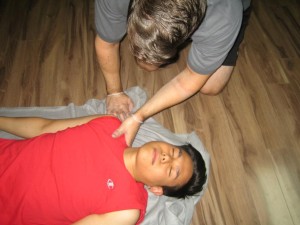Syncope is the medical term for fainting or passing out. It is described as the sudden, temporary loss of consciousness. It is caused by the brief decrease in the blood flow to the brain. Consciousness is gained spontaneously and usually right away, but may feel confused immediately after.
Syncope is a common condition, affecting 3% of men and 3.5% of women in their lifetime. While this condition can occur at any age, it becomes increasingly common as you age and occurs up to 6% of individuals over 75 years old. Although it is common, evaluation for the patient should be done immediately to rule out serious conditions.
Near syncope should not be confused with syncope. Near syncope is the feeling of being lightheaded and is usually a warning sign of an impending episode of syncope. However, their causes are the same.
Causes of Syncope
Syncope is caused by a temporary deficiency in the cerebral blood flow. It is usually the result of decreased cardiac output. These causes are usually benign.
- Sudden drop in blood pressure – e.g. orthostatic hypotension
- A drop in the heart rate
- A change in the amount of blood in regions of the body
- Stressful situations
- Arrhythmia
- Use of illegal drugs
- Internal hemorrhage
For syncope that occurs with any of the following, the fainting may be caused by an underlying medical disorder. These medical conditions are usually problems with the heart or the nervous system.
- After exercise
- After eating
Signs and Symptoms of Syncope
Syncope may or may not manifest with the following symptoms:

- Sudden and temporary loss of consciousness or passing out
- Sudden fall for no apparent reason
- Motionless
- Lightheadedness
- Dizziness
- Headache
- Drowsiness or grogginess
- Feeling unsteady or weak, especially when standing
- Having a tunnel vision or seeing spots
- Cool extremities
- Weak pulse
- Shallow breathing
- Involuntary muscle jerks
For most patients, they experience premonitory symptoms. These symptoms often serve as a warning sign that syncope is about to happen:
- Lightheadedness
- Nausea
- Fluttering in the chest (known as heart palpitations )
- Changes in vision
First Aid Management for Syncope
Because the causes of syncope may range from a benign cause to a serious condition, it is important to give first aid to any patient who suffers from syncope. Join first aid courses to learn how to handle unconscious patients. The following can be done for patients who suffer from syncope:
If one is feeling faint:
- Sit down or lie down. If one opts to sit down, put the head in between the knees.
If someone else faints:
- Position the patient to be on his/her back.
- If the patient is breathing, raise the patient’s legs above heart level (1 foot or 30cm) to restore blood flow to the brain.
- Loosen any constrictive clothing such as collars or belts.
- Call for emergency medical services if the patient does not regain consciousness after one minute.
- Check the patient’s airway if anything is obstructing. Watch for vomiting.
- If there is no pulse, initiate CPR. Call for emergency medical services.
- If there is bleeding, treat accordingly.
Fainting, medically known as syncope, is the temporary loss of consciousness caused by the brief decrease in blood flow to brain.
Sources:
